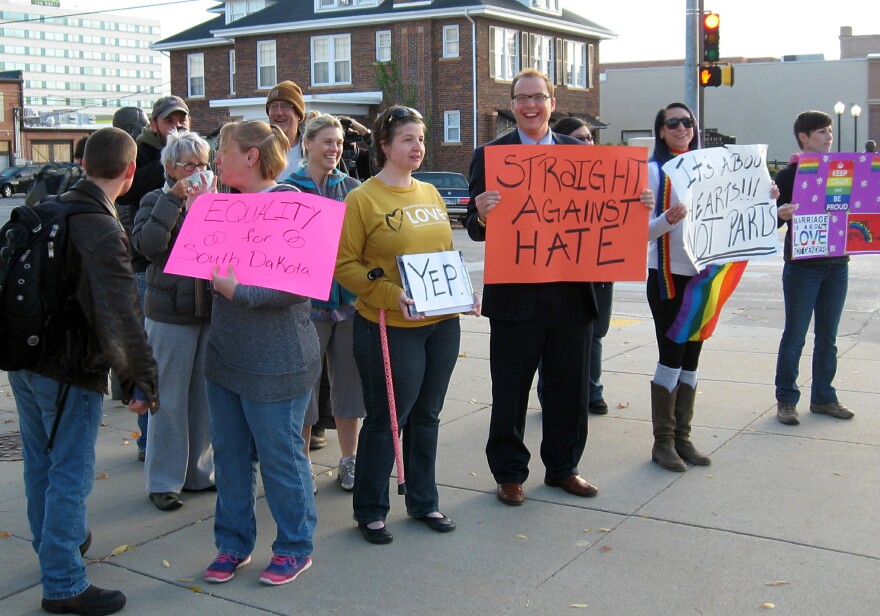On Friday morning, demonstrators gather at the Rapid City federal courthouse to express their support for marriage equality. At that same hour, same-sex marriage is at issue in a Sioux Falls federal courtroom, where Judge Karen Schreier is considering the fate of a lawsuit challenging South Dakota’s statutory and constitutional bans on gay marriage.
The demontrators stand on the corner of 9th Street and St. Joe, holding signs and cheering when drivers honk in support.
Luke Huber came from Spearfish to stand with a sign that reads on one side, “If I can’t marry my boyfriend, then I’ll marry your daughter.”
Huber says when he’s ready to commit to someone, he wants a marriage, not a civil union.
“It’s like a young girl, she looks forward to wearing her white dress someday, not for her civil union,” he says. “We look forward to having our wedding, not our civil union, to have that realness of it, you know?”
The other side of Huber’s sign also contains writing, which he reads aloud:
“I can vote because I’m human, not because I’m male. I can go to school because I’m human, not because I’m white. One day I want to get married because I’m human, not because I’m straight.”
Another sign in the crowd says, “Did I vote on your marriage?” Holding it is Scott Burcham, who says the court has the duty to uphold the Constitution against Biblical arguments.
“They have to follow the Constitution. They can’t go by their religious beliefs or anything. That’s what they’re there for. They’re supposed to follow the Constitution. Period,” Burcham says. “I think in South Dakota it’s a big religious issue.”
Several of the demonstrators identify as heterosexual but say they want to show support for marriage equality.
Caitlin Moynahan is one of them.
“I’m here because people are people, and they should be able to get married if they want to,” she says. “I don’t want to get married, but I can if I want to.”
One of the demonstrators is attorney David Patton with the Black Hills Center for Equality and Black Hills Equality Coalition.
Patton says same-sex marriage has withstood legal challenges and is now legal in 35 states and the District of Columbia. He believes South Dakota’s federal court will rule that the state law and constitutional provisions are unconstitutional, and as a result, the 8th Circuit Court of Appeals will eventually have to rule on that decision.
Patton says the 8th Circuit will no doubt consider appeals from states other than South Dakota. And that court’s opinion could be pivotal.
“Most likely they would consolidate all of the district court decisions into a single 8th Circuit case and then at that point, if the 8th Circuit decides against marriage equality, it’s almost certainly going to be the case the [U.S.] Supreme Court would pick up,” Patton says. “Because right now the Supreme Court has passed on all of the cases, and the reason they passed—and Ruth Bader Ginsberg made this clear when she spoke at the University of Minnesota—the reason why the Supreme Court has passed on cases is because there’s no disagreement among circuits.”
Patton says as long as appeals circuits continue to decide in favor of marriage equality, the U.S. Supreme Court won’t take up the issue.
Rapid City Demonstrators Gather To Support Marriage Equality

Photo by Victoria Wicks



